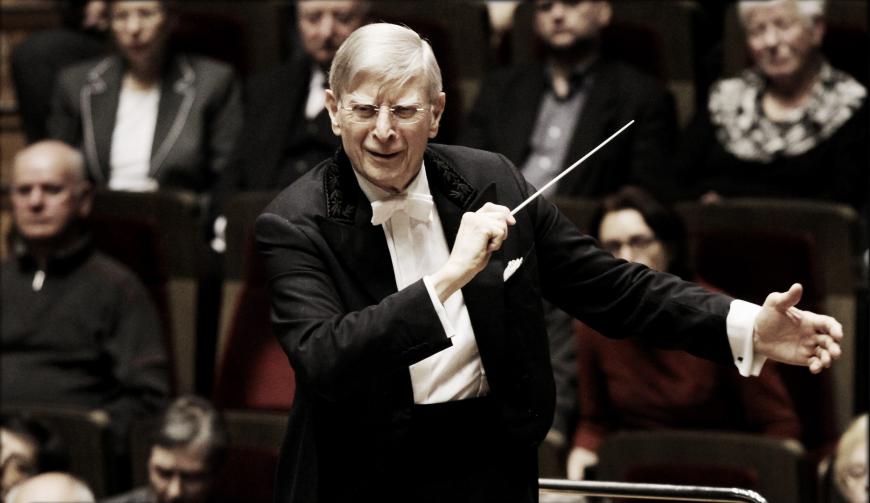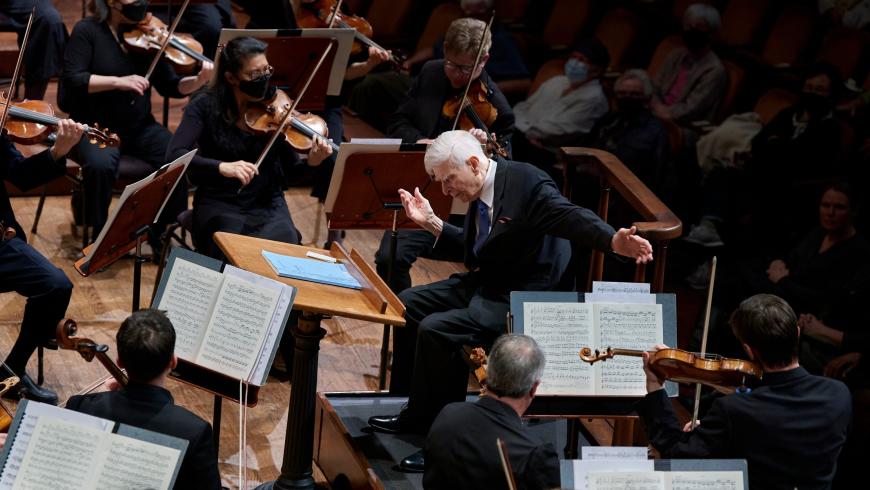
Guinness World Records will tell you otherwise, but in fact, the world’s oldest active “mainstream” symphony conductor is Herbert Blomstedt, 95.
Orchestra conductors have always lived longer than people in other professions. Famous conductors of the past, then in an era when life expectancy was around 50 years, lived well into their 80s and 90s — Leopold Stokowski (95), Pablo Casals (96), Nadia Boulanger (92), and Arturo Toscanini (89), to name a few.
Stokowski went beyond his Fantasia fame and continued to conduct major orchestras until his death. (I saw him conduct in London in 1977, a few months before his death.)
Add that general tendency to an increase in average life expectancy, and the number of “senior” conductors is peaking.
For the San Francisco Symphony alone, all its living former music directors are in that category. Besides Blomstedt (with the SF Symphony from 1985–1995), there’s Seiji Ozawa (87, with SFS 1970–1976), Edo de Waart (81, with SFS 1970-1985), and Michael Tilson Thomas (78, with SFS 1995–2020).

“Retirement is not a question of age,” Blomstedt has said, “it should be flexible. I just love the music so much that I just can’t give up. There are always things that I want to learn. I’m never satisfied. I’m happy for the results we get now and then, but I’m not really satisfied. Satisfaction lies in the hope of even better possibilities in the future, and I want to take all those chances.”
Whatever’s in the water in San Francisco, conductors’ longevity is witnessed around the world. While demonstrators in Paris are turning the town upside down, protesting the change of retirement age from 62 to 64, conductors 20 and 30 years older “just take a licking and keep on ticking.”
The phenomenon has long been studied and marveled at — or just envied. A simple, but not complete, reason cited in a Metropolitan Life Insurance study, which showed that orchestra conductors live 38 percent longer than the general population, was that conducting is good cardiovascular exercise.
Upper-body fitness programs claim to strengthen heart and lungs, improve posture, flexibility, and balance, reduce pain and stress, aid in weight loss, and raise endorphin levels. Even if this is all true, chances are that waving your arms for however long does not equal the total experience of leading an orchestra.
Just ask these famous old-timers, many still working:
Christoph von Dohnányi (93), Richard Bonynge (92), Roger Norrington (89), Zubin Mehta (86), Charles Dutoit (86), Neeme Järvi (85), Yuri Temirkanov (84), Marek Janowski (84), Riccardo Muti (81, who had his Chicago Symphony contract extended at 80), Lothar Zagrosek (80), Daniel Barenboim (80, who just retired as music director in Berlin), Dennis Russell Davies (79), Andrew Davis (79), Leif Segerstam (79), Leonard Slatkin (78), Joseph Rescigno (77), and Christof Perick (77).
Finally, back to the ageless wonder of Blomstedt, as hailed by New Yorker music critic Alex Ross:
“The esteem in which orchestras and audiences now hold Blomstedt is a belated reward for a resolutely unshowy musician who has gone about his business decade after decade. What he offers, above all, is a kind of preternatural rightness: no gesture feels out of place, no gesture feels routine.”
And of Blomstedt’s 2021 concerts at Tanglewood:
“Brisk, brusque Beethoven has, in fact, become the norm, as predictable as the old Wagnerian wallow. Blomstedt is aware of the pitfalls. At the dress rehearsal, he stopped several times to hum passages to the orchestra, seeking more varied, songful phrasing. The result was a performance that surged with vitality without boxing the ears.”




